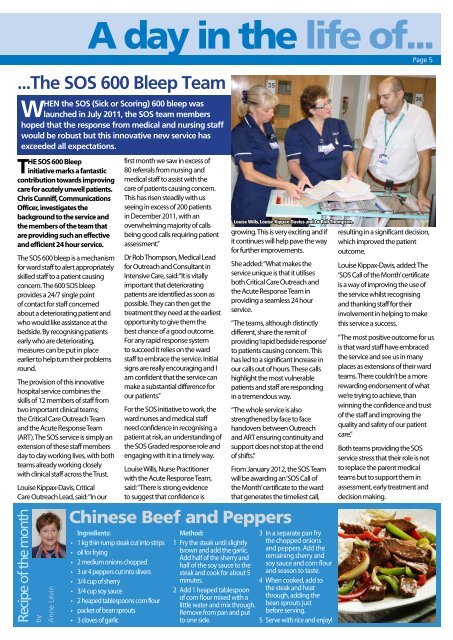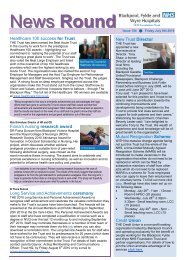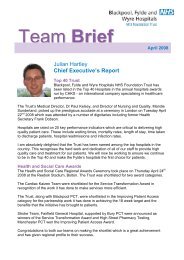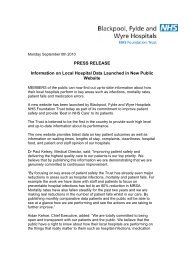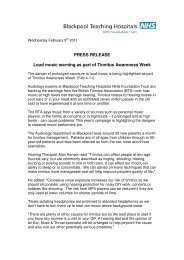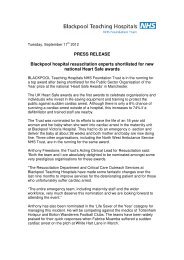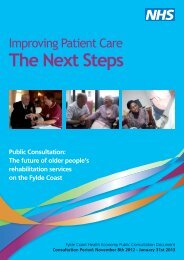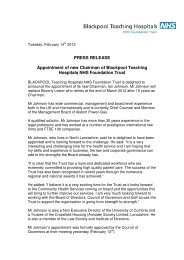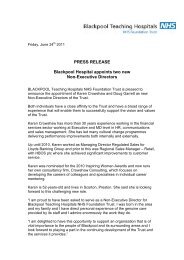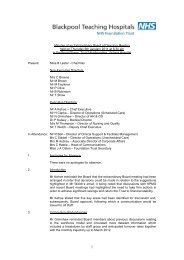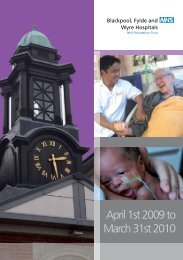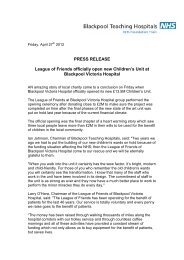news page
Issue 26 - January 2012 - Blackpool, Fylde and Wyre Hospitals NHS ...
Issue 26 - January 2012 - Blackpool, Fylde and Wyre Hospitals NHS ...
- No tags were found...
Create successful ePaper yourself
Turn your PDF publications into a flip-book with our unique Google optimized e-Paper software.
A day in the life of...<br />
Page 5<br />
...The SOS 600 Bleep Team<br />
WHEN the SOS (Sick or Scoring) 600 bleep was<br />
launched in July 2011, the SOS team members<br />
hoped that the response from medical and nursing staff<br />
would be robust but this innovative new service has<br />
exceeded all expectations.<br />
The SOS 600 Bleep<br />
initiative marks a fantastic<br />
contribution towards improving<br />
care for acutely unwell patients.<br />
Chris Cunniff, Communications<br />
Officer, investigates the<br />
background to the service and<br />
the members of the team that<br />
are providing such an effective<br />
and efficient 24 hour service.<br />
The SOS 600 bleep is a mechanism<br />
for ward staff to alert appropriately<br />
skilled staff to a patient causing<br />
concern. The 600 SOS bleep<br />
provides a 24/7 single point<br />
of contact for staff concerned<br />
about a deteriorating patient and<br />
who would like assistance at the<br />
bedside. By recognising patients<br />
early who are deteriorating,<br />
measures can be put in place<br />
earlier to help turn their problems<br />
round.<br />
The provision of this innovative<br />
hospital service combines the<br />
skills of 12 members of staff from<br />
two important clinical teams;<br />
the Critical Care Outreach Team<br />
and the Acute Response Team<br />
(ART). The SOS service is simply an<br />
extension of these staff members<br />
day to day working lives, with both<br />
teams already working closely<br />
with clinical staff across the Trust.<br />
Louise Kippax-Davis, Critical<br />
Care Outreach Lead, said: “In our<br />
Recipe of the month<br />
by<br />
Anne Levin<br />
first month we saw in excess of<br />
80 referrals from nursing and<br />
medical staff to assist with the<br />
care of patients causing concern.<br />
This has risen steadily with us<br />
seeing in excess of 200 patients<br />
in December 2011, with an<br />
overwhelming majority of calls<br />
being good calls requiring patient<br />
assessment.”<br />
Dr Rob Thompson, Medical Lead<br />
for Outreach and Consultant in<br />
Intensive Care, said: “It is vitally<br />
important that deteriorating<br />
patients are identified as soon as<br />
possible. They can then get the<br />
treatment they need at the earliest<br />
opportunity to give them the<br />
best chance of a good outcome.<br />
For any rapid response system<br />
to succeed it relies on the ward<br />
staff to embrace the service. Initial<br />
signs are really encouraging and I<br />
am confident that the service can<br />
make a substantial difference for<br />
our patients.”<br />
For the SOS initiative to work, the<br />
ward nurses and medical staff<br />
need confidence in recognising a<br />
patient at risk, an understanding of<br />
the SOS Graded response role and<br />
engaging with it in a timely way.<br />
Louise Wills, Nurse Practitioner<br />
with the Acute Response Team,<br />
said: “There is strong evidence<br />
to suggest that confidence is<br />
growing. This is very exciting and if<br />
it continues will help pave the way<br />
for further improvements.<br />
She added: “What makes the<br />
service unique is that it utilises<br />
both Critical Care Outreach and<br />
the Acute Response Team in<br />
providing a seamless 24 hour<br />
service.<br />
“The teams, although distinctly<br />
different, share the remit of<br />
providing ‘rapid bedside response’<br />
to patients causing concern. This<br />
has led to a significant increase in<br />
our calls out of hours. These calls<br />
highlight the most vulnerable<br />
patients and staff are responding<br />
in a tremendous way.<br />
“The whole service is also<br />
strengthened by face to face<br />
handovers between Outreach<br />
and ART ensuring continuity and<br />
support does not stop at the end<br />
of shifts.”<br />
From January 2012, the SOS Team<br />
will be awarding an ‘SOS Call of<br />
the Month’ certificate to the ward<br />
that generates the timeliest call,<br />
Chinese Beef and Peppers<br />
Ingredients:<br />
• 1 kg thin rump steak cut into strips<br />
• oil for frying<br />
• 2 medium onions chopped<br />
• 3 or 4 peppers cut into slivers<br />
• 3/4 cup of sherry<br />
• 3/4 cup soy sauce<br />
• 2 heaped tablespoons corn flour<br />
• packet of bean sprouts<br />
• 3 cloves of garlic<br />
Method:<br />
1 Fry the steak until slightly<br />
brown and add the garlic.<br />
Add half of the sherry and<br />
half of the soy sauce to the<br />
steak and cook for about 5<br />
minutes.<br />
2 Add 1 heaped tablespoon<br />
of corn flour mixed with a<br />
little water and mix through.<br />
Remove from pan and put<br />
to one side.<br />
Louise Wills, Louise Kippax-Davies and Dr Rob Thompson.<br />
3 In a separate pan fry<br />
the chopped onions<br />
and peppers. Add the<br />
remaining sherry and<br />
soy sauce and corn flour<br />
and season to taste.<br />
4 When cooked, add to<br />
the steak and heat<br />
through, adding the<br />
bean sprouts just<br />
before serving.<br />
5 Serve with rice and enjoy!<br />
resulting in a significant decision,<br />
which improved the patient<br />
outcome.<br />
Louise Kippax-Davis, added: The<br />
‘SOS Call of the Month’ certificate<br />
is a way of improving the use of<br />
the service whilst recognising<br />
and thanking staff for their<br />
involvement in helping to make<br />
this service a success.<br />
“The most positive outcome for us<br />
is that ward staff have embraced<br />
the service and see us in many<br />
places as extensions of their ward<br />
teams. There couldn’t be a more<br />
rewarding endorsement of what<br />
we’re trying to achieve, than<br />
winning the confidence and trust<br />
of the staff and improving the<br />
quality and safety of our patient<br />
care.”<br />
Both teams providing the SOS<br />
service stress that their role is not<br />
to replace the parent medical<br />
teams but to support them in<br />
assessment, early treatment and<br />
decision making.


